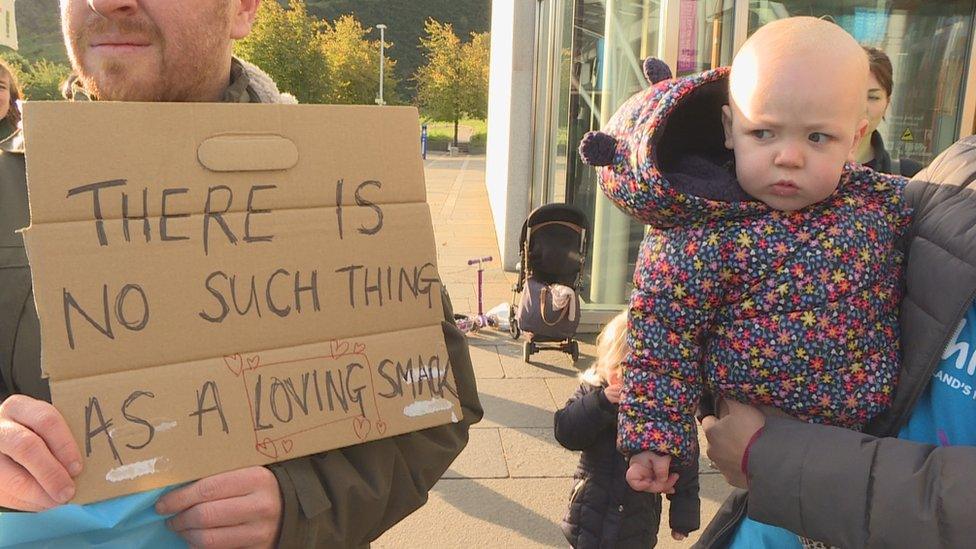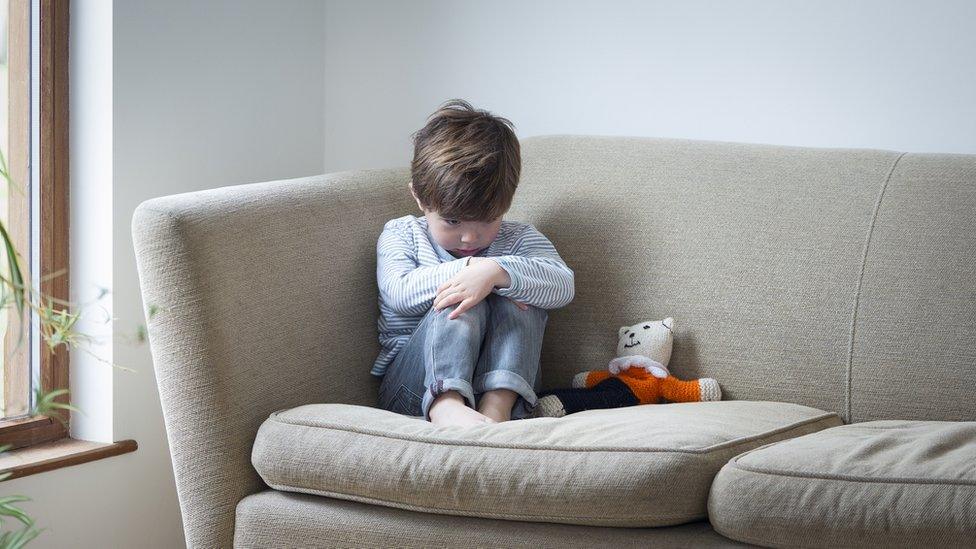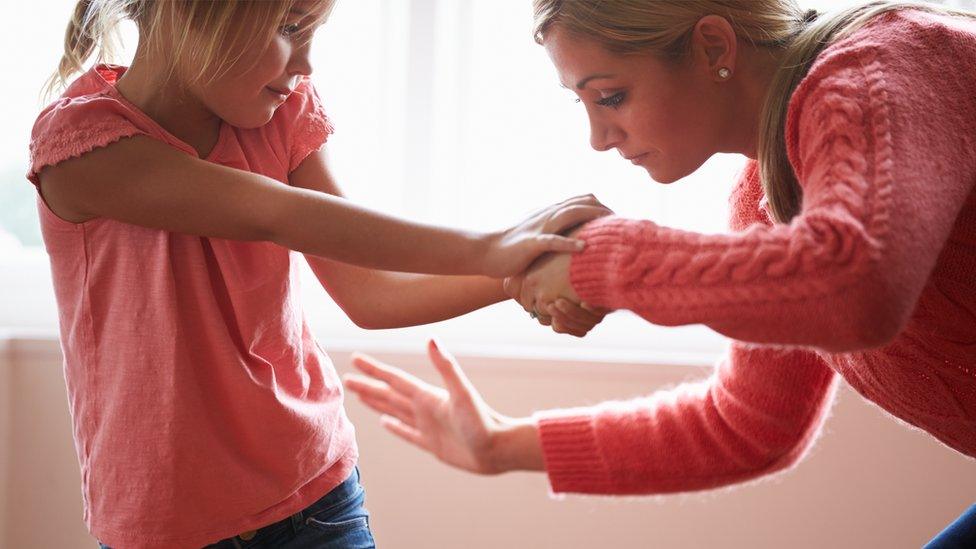Scotland becomes first part of UK to ban smacking
- Published

Backers of the bill rallied outside Holyrood on the morning of the vote
Scotland's ban on parents smacking their children has become law, making it the first part of the UK to outlaw physical punishment of under-16s.
Parents and carers were previously allowed to use physical force to discipline their children if it was considered "reasonable chastisement".
The new law means that the so-called "justifiable assault" defence is no longer available.
It seeks to give children the same protection from assault as adults.
Sweden was the first country in the world to ban smacking in the home when it outlawed corporal punishment in 1979. Scotland has now become the 58th to do so.
In January, Wales was the second part of the UK to pass a law banning people from smacking their children. It will begin in 2022.
There are not currently any plans for England or Northern Ireland to follow suit.
Children's charity the NSPCC said Scotland's ban was a "common sense" move.
The charity's Joanna Barrett said: "This law sets out in clear terms that physical punishment should no longer be part of childhood in Scotland and it marks a momentous step in making it a country where children's rights are truly recognised, respected and fulfilled."
'Violence is never acceptable'
The smacking ban bill was introduced to the Scottish Parliament by Scottish Greens MSP John Finnie, a former police officer, who won the support of the SNP, Labour and Lib Dems as well as his own party and many children's charities.
Mr Finnie said smacking teaches children that "might is right", and that the ban would "send a strong message that violence is never acceptable in any setting".
Children's Minister Maree Todd said: "This outdated defence has no place in a modern Scotland. It can never be reasonable to strike a child."
Opponents argued the changes were "unnecessary" as existing laws already protected children from abuse at the hands of adults.
They said the changes would do nothing to help vulnerable children who were the victims of serious physical abuse, but could cause traumatic interventions in "good" families, who use discipline such as a smack on the bottom.
What was the law on physical punishment of children?

Opponents of the ban say mild smacking does no long-term harm to a child
Previously, when deciding whether the chastisement of a child under 16 was reasonable, the courts took into account factors such as the nature of the punishment, its duration and frequency, the age of the child and the effect - both physical and mental - it had on them.
In practice, this generally meant parents were allowed to smack their children on the body - but blows to the head, shaking or the use of an implement were illegal.
All physical punishment in schools and other education settings was already completely banned.
How will this change?
The bill will end the defence of "reasonable chastisement", meaning parents could face prosecution for any use of physical punishment on their children.
The act uses the same definition of physical punishment, sometimes referred to as corporal punishment, used by the UN Committee on the Rights of the Child.
It includes hitting such as smacking, slapping and smacking with a hand or an implement, as well as kicking, shaking or throwing children, scratching, pinching, biting, pulling hair or boxing ears, forcing children to stay in uncomfortable positions, burning, scalding or forced ingestion.
How widespread is smacking anyway?
A report published by a group of Scottish children's charities, external in 2015 found that the physical punishment of children was more common in the UK than in similar countries such as the US, Canada, Italy, Germany and Sweden.
The researchers estimated that between 70% and 80% of parents in the UK had used physical punishment, with children aged between three and seven the most likely to be smacked.
They also found that many parents did not view smacking as a "good thing", but believed that sometimes it was the "only thing that will work".
The researchers also said the use of physical chastisement had declined over the years, alongside a shift in public attitudes, with "convincing evidence" that the decline had been steeper in the more than 50 countries around the world that had already banned smacking.
Research examining the views of children on smacking has suggested that it hurts and upsets them, and does not always stop bad behaviour.
What do opponents of the ban say?
A campaign against the ban was led by the Be Reasonable Scotland group, which called the legislation "draconian" and argued it could do more harm than good.
The group argues that the existing law only allowed parents to use "very mild discipline" such as a smack on the hand or bottom - which could become a criminal offence in the future.
A spokesman said: "In the years ahead, loving parents who have had no contact with the authorities previously and who present no risk to their children will face stressful intervention, blacklisting on police databases and even criminal records for smacking. The majority of Scots see this as an injustice, not a positive change."
They urged the government to instead invest in social work and other services to improve their ability to identify and tackle genuine abuse.
What is the law elsewhere?
Parents in England and Wales can currently face criminal charges if they hit a child so hard that it leaves a mark, or causes bruising, swelling, cuts, grazes or scratches.
However, Wales has now passed an outright ban that will remove the defence of "reasonable punishment" that has been in force since Victorian times in England and Wales.
There have been calls for England to follow suit, with the Association of Educational Psychologists saying last year that smacking is harmful to children's mental health and should be banned.
Northern Ireland has similar legal provisions to those in England and Wales, while Ireland banned smacking in 2015.
- Published3 October 2019

- Published28 January 2020
